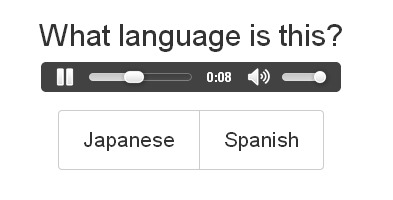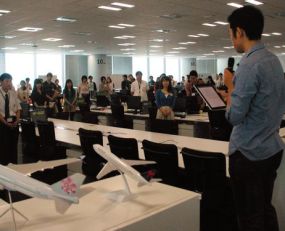(Hover your mouse over the underlined words to see the definition.)
My partner Paolo and I celebrated our anniversary several weeks ago. Since we had agreed to cut back on expenses, I resisted the urge to get him something  fancy and instead made this portrait to give to him as an anniversary gift. (Our daughter and I are hidden somewhere in the picture. =D)
fancy and instead made this portrait to give to him as an anniversary gift. (Our daughter and I are hidden somewhere in the picture. =D)
This event reminded me of a particular phrase construction that is often overlooked even by fluent speakers of English. While not strictly an error, it is often considered clutter. Consider the greetings “Happy 2nd-year anniversary!” or “Congratulations on your 10th-year anniversary!” While it is, of course, the thought that counts, it wouldn’t hurt to be more cogent in our speech or writing.
Did you spot the clutter?
Redundancies
Redundancy is defined by Dictionary.com as using more information than is necessary for one to be able to understand the idea. The term tends to have a negative connotation because it uses multiple words where one is enough, making speech superfluous.
Here are a few redundant phrases to avoid:
frozen ice
descend down
join together
repeat again
past history
unconfirmed rumor
over-exaggerate
anonymous stranger
(For an extensive list of redundancies, click here.)
Similarly, “2nd-year anniversary” is redundant because “anniversary” comes from the word annum which means year. Saying 2nd-year anniversary is therefore like saying 2nd-year year. To simply say “2nd anniversary” is enough.
Redundant Acronym Syndrome
A person is said to be suffering from Redundant Acronym Syndrome or RAS syndrome if he or she uses a word that makes up the acronym together with the acronym itself, in effect repeating the word. Some examples are ATM machine (automated teller machine machine), LCD display (liquid crystal display display), and PIN number (personal identification number number). The acronym of this syndrome — RAS syndrome or Redundant Acronym Syndrome syndrome — is in itself a redundancy.
Are redundancies always bad?
Linguists say that some redundancies serve a purpose, which is to emphasize or clarify an idea. Consider “future plans.” The phrase might seem just like any redundancy because if you are talking about any plans you have now, they are most certainly for the future. “What are your future plans?” is undoubtedly redundant and you will be better off saying, “What are your plans?” However, you could also be talking about plans you’ve had in the past or your previous plans, in which case adding the modifier future would serve to differentiate the two: “All my plans have backfired. I’ll make sure my future plans won’t.” It is the needless repetitions that should be avoided at all costs.
As Professor William Strunk, Jr. once said, “Vigorous writing is concise. A sentence should contain no unnecessary words, a paragraph no unnecessary sentences, for the same reason that a drawing should not have unnecessary lines and a machine no unnecessary parts.” Longer is not always better but it doesn’t mean we should make all sentences short either. The important thing is to make every word count.






